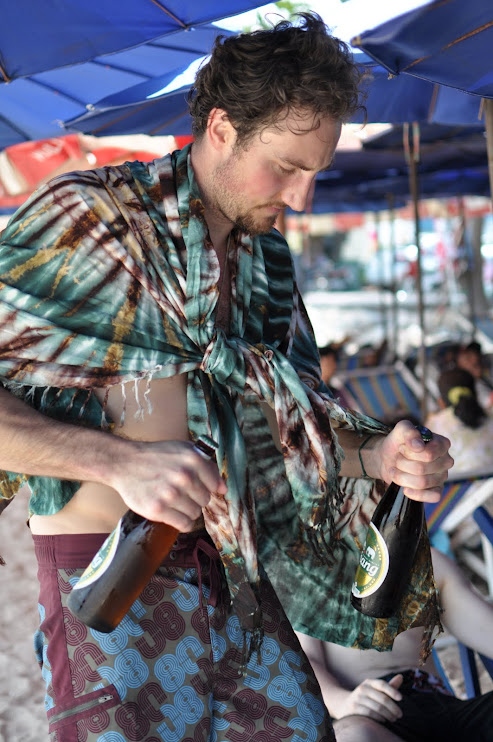
It was around the 4th beer that I noticed it, like a soot-faced miner easing off his boots after a long shift underground, our vocabularies were sighing into a more casual realm. It was subtle at first, just the odd drop of an expletive, but as the beers went down so did the politeness. The “here” was a corner table in a three floored izakaya famous for cheep mugs of frosty golden deliciousness. I was occupying a tiny seat at a tiny table, surrounded by three western-sized friends who were having an equally difficult time making sense of sitting side-saddle. As we drank the metaphorical swear-jar began to swell, silvery 50yen coins pierced through the center to start with but finishing with the ominous thump of the heavy gold 500yeners, and all this got me thinking about the reason for such verbally graphic usages. Back in the US, and around other native English speakers that I feel comfortable with, the clever use of a swear word helps to emphasize the bonds I have with these people. I suppose I can’t speak for everyone out there but honestly how often do you find yourself cursing in a conversation with a person you don’t know? With your boss? Or how about with your Grandmother? And equally how likely would you be to choose these same people to be the best man/maid of honor at your wedding? Swearing tells all in the conversation that we’re close enough friends to not be bothered by such depravity. We don’t need the mask of politeness to maintain a positive image in our friends minds, they already know who we are. It’s the ultimate level of casual. But here in Japan the approach is a little different.
I remember scoffing when I was told that Japanese, when compared to Korean (which is of the same origin), has very few words that we in the west would consider to be swear words. They have words for describing sex organs and fecal matter don’t they? Surely these can be used in a derogatory way. However, that’s not really the case.
 |
Ehhhhhhhhh? 嘘!I don't believe it!
It’s true that some do exist, but when contrasted against swearing in Spanish, for example, you almost want to tuck their cuteness into bed before 9. Really, it’s like child’s attempt at playing daddy. In fact, I’ve only come across one word that’s banned from use on television; 真婿 (manko), which is little more than a crude reference to vagina. The more I learn about this lack of expletive expression the more I become convinced that it’s the result of the country's pre-industrial caste system. Here instead of slinging vocal mud, when insults are levied, the offenses are more commonly the consequence of a failure to observe politeness. Whether intentional or not, this can range anywhere from using the improper suffix on one’s name (-chan for children, -san for equals, and –sama for those above you) to the depth of your bow not being sufficient. Furthermore, rather than individual words marking the distinction between polite and casual speech, there’s a whole different level of grammar, 敬語(keigo), one uses when wanting to be formal. For more than 1000 years and as recent as 138 years ago in Japan a Samurai 侍 (derived from a verb meaning to serve) could kill any commoner who showed them disrespect. Meaning that the peasant class had to be incredibly careful with their language and conduct. So, in a sense, Darwin’s survival of the fittest applied itself to the language and the inoffensive were allowed to keep their heads on their shoulders and keep breeding. |
 Flash forward to modern times and this legacy of politeness is still burning strong in all the Japanese I’ve come across. However the older generations sometimes raise an interesting point, they complain that youngsters are phasing this formality out and losing the more traditional forms of speech. It makes me wonder that if the trend continues, will the distinction between polite and casual fade, and if this is the case, will Japanese develop harsher forms of profanity to fill in the gap? We’ll just have to wait and see.
Flash forward to modern times and this legacy of politeness is still burning strong in all the Japanese I’ve come across. However the older generations sometimes raise an interesting point, they complain that youngsters are phasing this formality out and losing the more traditional forms of speech. It makes me wonder that if the trend continues, will the distinction between polite and casual fade, and if this is the case, will Japanese develop harsher forms of profanity to fill in the gap? We’ll just have to wait and see.

























